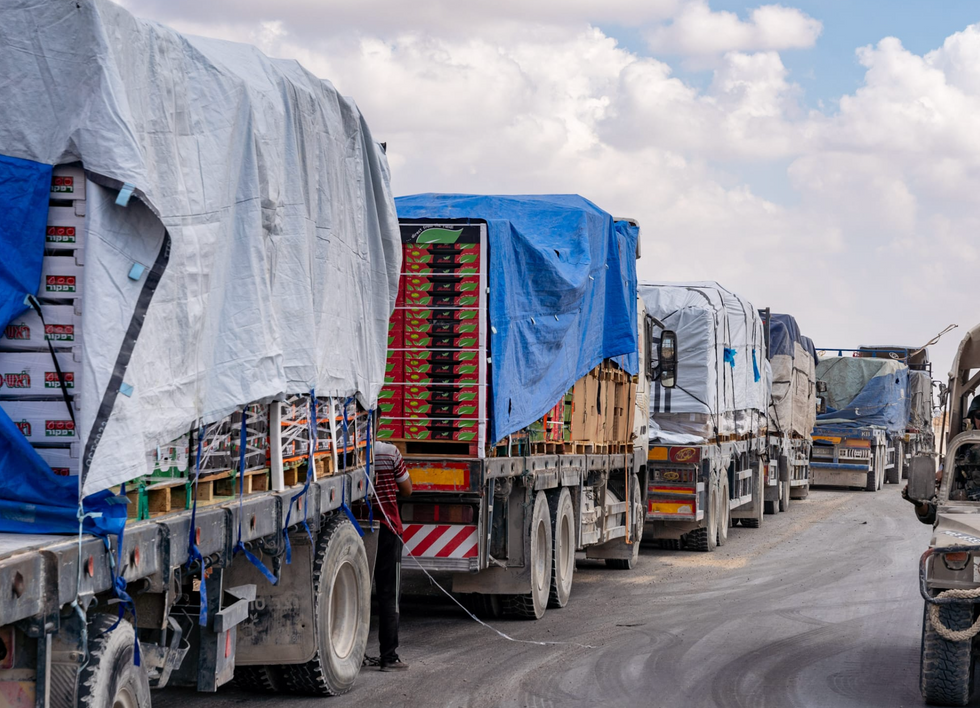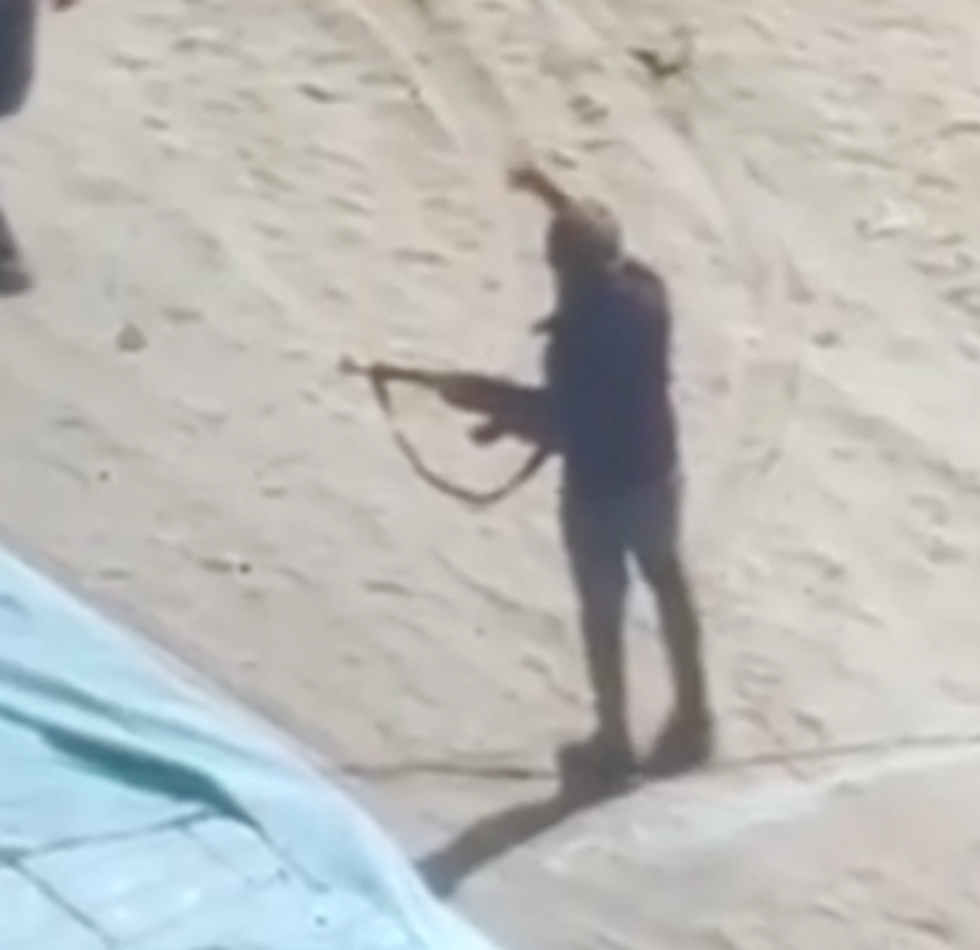The Foreign Secretary's decision appears to rest heavily on the claim that Israel is blocking aid convoys into Gaza
Don't Miss
Most Read
Trending on GB News
The UK Government has been accused of "bowing to the mob" over its partial arms ban on Israel after images and eyewitness accounts shared exclusively with GB News appear to show Hamas hijacking food aid trucks in Gaza.
On September 2nd, David Lammy, the Foreign Secretary, announced the suspension of 30 arms licences to Israel.
These include components for fighter aircraft (F-16s), parts for Unmanned Aerial Vehicles (UAVs or drones), naval systems, and targeting equipment.
Mr Lammy said he had decided to suspend licences because he had concluded that for certain UK arms exports to Israel “there exists a clear risk that they might be used to commit or facilitate a serious violation of international humanitarian law”.

A queue of food aid trucks on the Palestinian side of the Rafah crossing after going through security
Daniel Berk
The decision follows an assessment of “Israel’s compliance with international humanitarian law in the context of war in Gaza”, commissioned by the Foreign Secretary upon on taking office in July 2024.
Ministers are compelled under British law to apply a "clear risk" test to assess whether exported kit could be used to breach international humanitarian law but in practice this process is opaque as it can be impossible to establish the facts on the ground.
Mr Lammy's decision appears to rest in part on the claim that Israel is blocking aid convoys into Gaza, particularly on the Rafah border crossing - a 12-kilometre (seven-mile) strip of land that separates Egypt from the Gaza Strip.
The crossing is one of the main entry points for transporting aid into the enclave.
Israeli forces captured the Rafah Crossing in May and it has remained closed ever since.
The British Red Cross claims that "only a trickle of aid is reaching the area" since the entry point was closed but this is fiercely contested.
For example, Israel’s civilian coordination agency for the Palestinian territories COGAT has been publishing the volume of aid going in daily and it "far exceeds what the World Food Program last October estimated the nutritional requirements to be", according to Natasha Hausdorff, an expert in international law volunteering with the organisation UK Lawyers for Israel (UKLFI).
As of September 19 - the latest date for which data is available - COGAT states that 182 trucks carrying humanitarian goods were transferred to Gaza, 143 through the Kerem Shalom Crossing and 39 via the Erez Crossing.
Not everyone agrees with this assessment. The Norwegian Refugee Council - an independent humanitarian organisation - recently published a data analysis on its website that claims 83 per cent of required food aid does not make it into Gaza, up from 34 per cent in 2023.
Eyewitness accounts from the Rafah crossing and videos shared exclusively with GB News suggest the problem is not necessarily getting aid in, it's transporting it to those who need it the most and herein the blame lies with Hamas - not Israel.
In early September, Daniel Berke, Director of UKLFI and founder of Military Expert Panel, travelled with the Deputy Commander of the 162nd Southern Command along the full length of the Philadelphia Corridor - a strategically important buffer zone along the Gaza-Egypt border.
Before aid trucks can be transported to civilian areas in Gaza, they have to be cleared for entry by Israeli forces on the Egyptian side.
Once through, they are driven by Palestinians to civilian areas.
Mr Berke shared with GB News a photo of 20 food aid trucks backed up on the Palestinian side of the Rafah crossing after going through security.
What happens next is out of Israel's hands. The UKLFI director has seen CCTV and drone footage shared by the IDF of Hamas gunmen "swarming" the food aid trucks before "hijacking" them en route to civilian areas.
"They climb onto the trucks. They do that because they know that Israel is not going to bomb aid trucks," he told GB News.
The IDF has shared footage with GB News that corroborates Mr Berke's account.
In one video, armed figures encircle the food aid trucks before climbing on top of them.
In another shocking moment, they appear to jump in front of a lorry containing goods before pulling out the driver and hijacking the vehicle.
The scenes are consistent with accounts from aid workers, who say they are systematically attacked and stopped by armed gangs who steal aid and sell it on the black market to Gazans for exorbitant amounts.
“The looting has become quite profound,” said Georgios Petropoulos, head of the UN Office for the Co-ordination of Humanitarian Affairs (OCHA) in Gaza.
“Meaningful decisions now have to be taken about what we will do for civil order in Gaza and who will take care of delivering that,” Mr Petropoulos told the BBC.
It's not immediately clear if it's Hamas that's intercepting the food aid trucks, organised crime cartels affiliated with the terrorist group or Gazan clans.
The enclave has become increasingly lawless after Israel’s military offensive removed the Hamas government and few police officers are left operating there.
The UKLFI director is under no illusion about who is behind the hijacking of food aid trucks.
"The aid is going in and you have to be extremely naive or willfully ignorant to think Hamas is not doing that," Mr Berke said, adding: "They are gangsters and I don't think as an organisation which is prepared to murder, rape and kidnap, it's beyond the realms of belief that they would also hijack food and sell it to their own people."
He bristles at Labour's partial arms ban, telling GB News that the party is "bowing to the mob at the expense of Israel and Jewish rights and protection".
LATEST NEWS DEVELOPMENTS

Gaza has become increasingly lawless after Israel’s military offensive removed Gaza’s Hamas government
IDF
In response to a request for comment, a spokesperson for the Foreign, Commonwealth & Development Office told GB News: "We condemn the abhorrent looting of aid convoys, whoever is involved.
“The humanitarian situation in Gaza is appalling, with far too many people facing starvation and not enough aid getting in. Humanitarian aid is a moral necessity in the face of such a catastrophe. All parties must comply with their obligations under International Humanitarian Law. From the Prime Minister down, we have repeatedly urged Israel to improve aid access, minimise civilian casualties and ensure the safety of aid workers.
“Our priority remains achieving a ceasefire, the release of hostages and unfettered access to lifesaving aid for those in Gaza.”
Orly Goldschmidt, spokesperson for the Embassy of Israel to the UK told GB News: "The tragic reality of Hamas terrorists hijacking aid provided by the international community, intended for innocent Palestinians, is a widely documented phenomenon. Hamas routinely steals aid from those who need it most. It is, indeed, part of their modus operandi and helps to sustain the terrorist organisation.
"Israel remains deeply committed to facilitating the large transfer of humanitarian aid to Palestinian civilians in Gaza."
The UN World Food Programme has not responded to repeated requests for comment. The British Red Cross declined to comment.
Sir Keir Starmer's Government has been criticised over its decision to announce the ban on exports shortly after the bodies of six hostages were returned to Israel.
Critics have also branded it a politically-motivated decision couched in legal terms.
Benjamin Netanyahu, Israel’s prime minister, said the decision will only serve to “embolden Hamas”, while the Israel Solidarity Movement warned it undermines intelligence-sharing and the fight against Islamic extremism at home and abroad.
Supporters feel the ban doesn't go far enough. Halima Begum, chief executive of Oxfam, said: “Suspending just 30 licences out of 350, and crucially leaving loopholes for components in F-35 fighter jets that have been dropping 2,000lb bombs on Palestinians for months now, is nowhere near adequate.
“In the time Parliament has been in recess alone, Oxfam estimates that over 1,100 people have been killed in Gaza by the Israeli military.
“By leaving a loophole that allows Israel to order weapons via third parties, the suspension is little more than window dressing.”
In reality, the partial arms ban will not have a material impact on Israel's operations in Gaza as it can simply get the kit from elsewhere.
But it sends a powerful political message at a time when the Middle East is on the precipice of a wider war.









